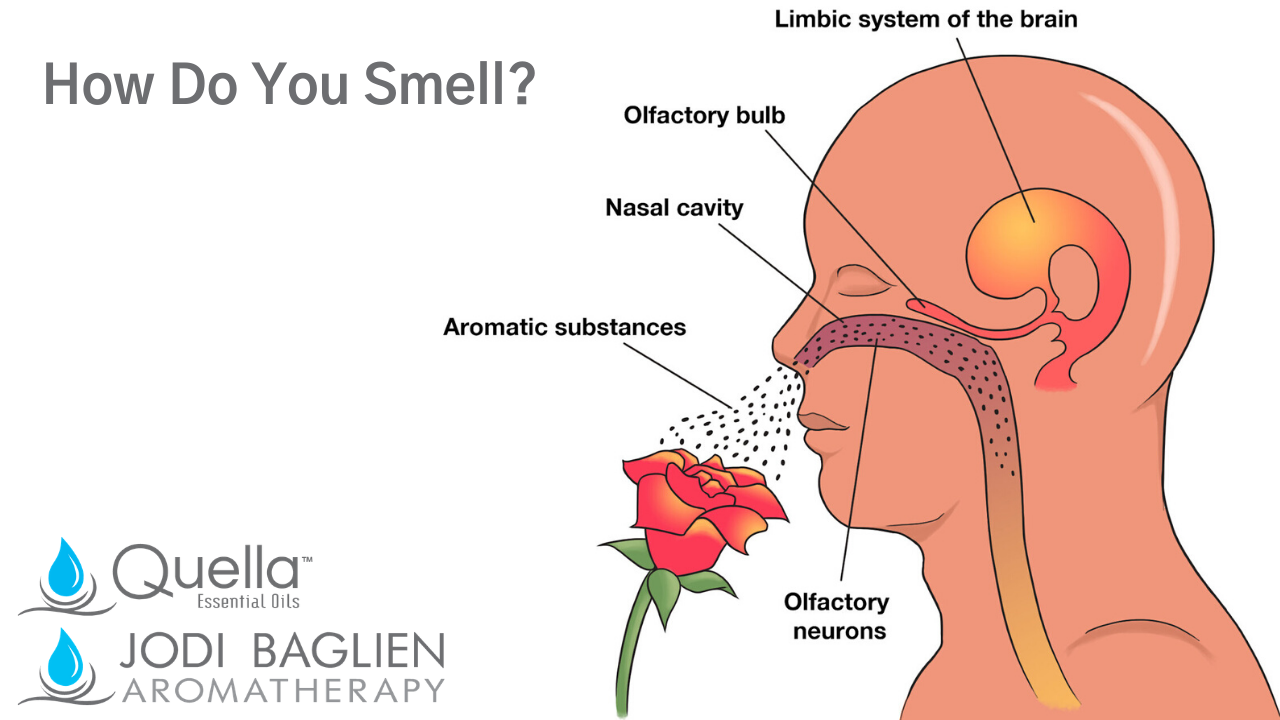How do you Smell?

Do you ever stop to think about the impact smells have on you during the day? Want to play with me for a minute?
Imagine you are smelling - puppy breath.
How about Crayons?
What changed in your mood? Did a smile sneak up on you? What images came up in your mind? Where did you go? How do you feel now?
If you have ever pondered the question - how can smelling essential oils shift my mood or state of mind? Read on. It' a great question to be able to answer, especially if you are caring for others with essential oils.
Here's a quick primer on our olfactory system, that I hope you find helpful!
Let's consider this scenario. You are fast asleep and suddenly awakened by the smell of smoke.
In this instant. . .
- The aroma molecules move past the receptor sites in your nose.
-
The olfactory nerves send a message to your limbic system.
-
Your limbic system analyses its stored "aroma-print" for smoke
-
This print most likely says: Smoke = fire = danger = send adrenaline!
Within a few whiffs of the aroma, you are energized by stress hormones like cortisol which creates energy/stress, helping you to take action.
Let's say that another way. You detected the smell of smoke, your brain responded accordingly by releasing biochemicals that shifted your focus, and changed your thoughts and emotions.
Yay! Your olfactory system saved the day! Thank you nose, the nose always knows!
This is how aromatherapy works!
When we inhale aromatic molecules, each essential oil has it's own unique chemical compounds and structure, its own electromagnetic frequencies, olfactory system, and limbic system analyses and then responds accordingly.
This information is relayed from the hypothalamus, by sending a signal to the pituitary gland, which produces a hormonal response - sending out the feel-good endorphins like oxytocin, serotonin, and dopamine, initiating a shift in our biochemistry!
For the aroma geeks like me, read on if you want to go a little deeper for more "olfactory facts" .
How Odors Change the Brain, Expectations, and Experience,
Affect Odor Perception –The Implications for Aromatherapy,
by John McGann, Ph.D., Associate Professor of Psychology, Behavioral and Systems Neuroscience Rutgers University.
Fun facts about our olfactory systems. . .
- We have 390 smell receptor sites, vision is based on 3 receptors (rods and cones), hmmm.
- Our smell sensitivity is EXCELLENT as compared to a mouse, spider monkey, pigtail macaque, squirrel monkey, dog, vampire bat, fruit bat, hedgehog, and rat!!)
- Your olfactory system is not static – it continues to learn until your last days!
- Human odor discrimination is excellent, we can tell a trillion odors apart (Bushdid et al)
- Loss of olfactory abilities has an unexpectedly large impact on human health, notably mental health.
- We saw images from “inside” the mouse brain, (they literally installed a window to observe) as compounds were inhaled and each individual odorant lit up specific spots in the brain.
- A particular odor may be made to evoke a particular emotion or mental state through experience.
We are pretty magical beings, aren't we? The take away here is a reminder to play with your oils, find the ones to help you "shift" your moods. And then keep them handy!
Be well,
Jodi Baglien
Stay connected with us for updates, success stories, and Aromatherapy musings!
Be a part of the culture shift - receive information about Aromatherapy in healthcare.
Don't worry, we don't send too much and your information will not be shared.
50% Complete
Two Step
Lorem ipsum dolor sit amet, consectetur adipiscing elit, sed do eiusmod tempor incididunt ut labore et dolore magna aliqua.
